Kerry, Rice, Flynn Talk Foreign Policy
Tracking the Highlights of USIP’s 'Passing the Baton' Transition Conference
Secretary of State John Kerry and National Security Advisor Susan Rice and designated incoming National Security Advisor Michael Flynn are among the Cabinet-level and other senior foreign policy and national security figures from the outgoing and incoming administrations gathering on Tuesday, Jan. 10 at USIP for a day of discussion about the global challenges facing the United States in the coming months and years. This live blog will track the highlights throughout the day from the scheduled 9:00am kickoff to the close at 6:15pm.

Watch the livestream and join the conversation on Twitter at #PassingTheBaton. See the agenda for the full schedule, and find bios of speakers and panelists here. Four USIP experts also weighed in beforehand on topics they think should be among the top foreign policy and national security priorities going forward. See those two-minute video interviews here.
Graham: Development a Key to Countering Violent Extremism
Senator Lindsey Graham said the incoming Trump administration should adopt a layered and multi-faceted approach to countering violent extremism and avoid striking deals with Russia that will set back democracy and ultimately help empower terrorists.
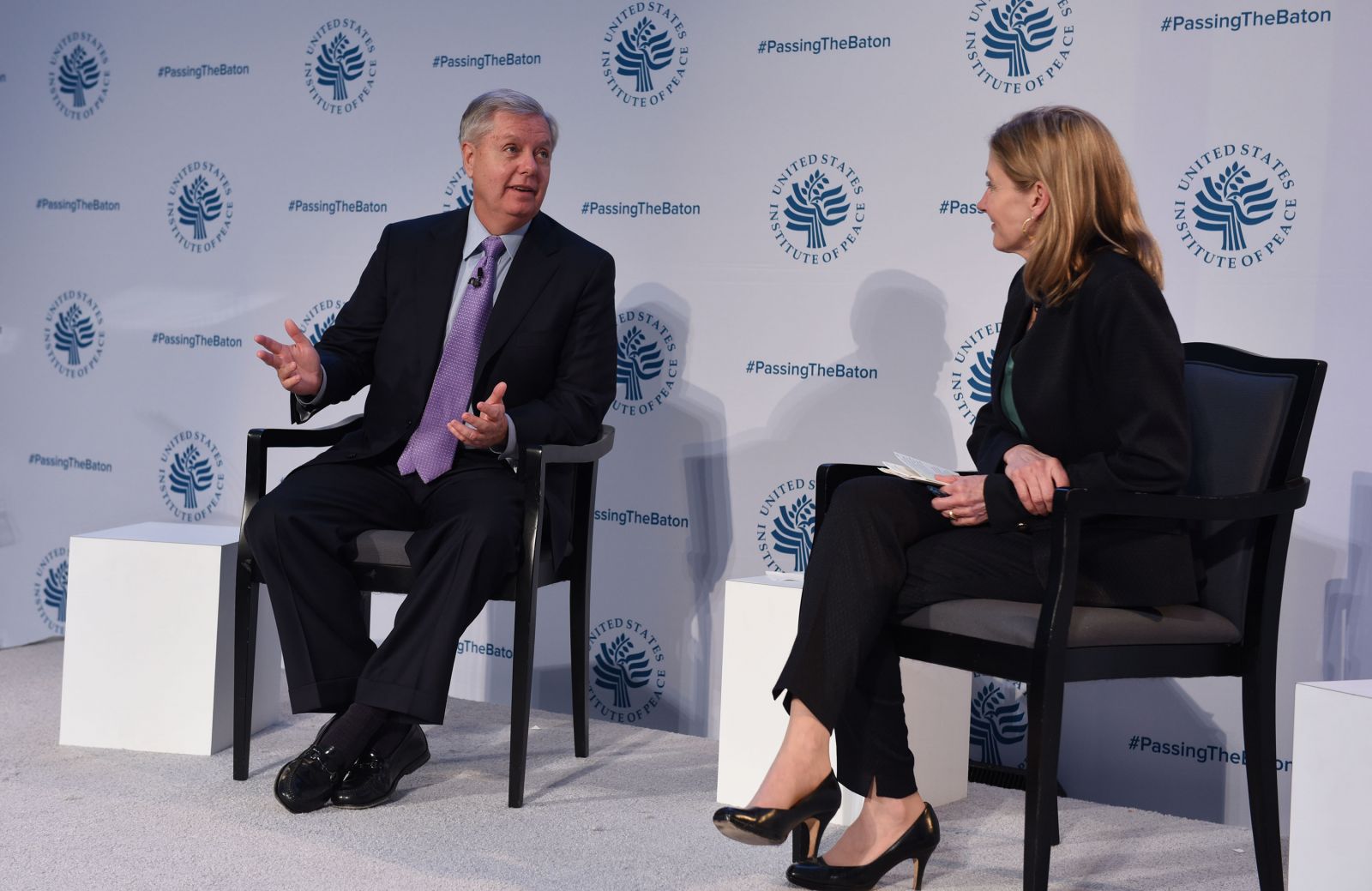
In a discussion with USIP President Nancy Lindborg, the senator said that the U.S. toolkit for curbing terrorism must include funding for economic development programs and promoting political rights in addition to military power and gathering intelligence.
“I’m trying to convince the new administration and my Republican colleagues that we’re going to pay now, or we’re going to pay later,” Graham said. “The worst nightmare for radical Islam is to get to the country before they do, invest in the lives of the young people before they can corrupt their lives,” Graham said. “The biggest antidote to terror above all else is giving a poor young girl a chance for an education and a voice for her children.
“That drives these guys nuts and that’s what I want to do,” he said.
Graham also said the new administration will need to make clear to the American people its goals regarding violent extremism.
“The first thing the president elect needs to decide in his own mind, what is winning the war on terror? It’s been hard for Americans to wrap their heads around what we’re doing,” Graham said. “When you get attacked, you want to blow everybody up. After two or three years, you want to leave everybody alone.”
Graham called Trump’s discussion of working with Russia to destroy radical Islam misguided, saying the president-elect doesn’t fully understand the forces at play, particularly in Syria.
“They’re not destroying radical Islam, they’re destroying the moderate forces that are trying to liberate the country from Assad,” he said. “If he insists that Assad stays in power, it’s going to be a nightmare for the Arab neighbors because the war never ends. I think it’s going to be a problem for Israel, and I think Turkey’s going to be in a world of hurt.”
“Any deal cooked up by Russia and the Iranians is probably not a good deal,” Graham said.
Reiterating his distaste for the Iran nuclear deal, and his support for Israel, Graham said he will introduce a bill tomorrow to stop funding to the U.N. until the Security Council rescinds its recent resolution on the legal status of Israeli construction outside the country’s 1967 boundaries.
Flynn Pledges U.S. Leadership, Engagement Around the World
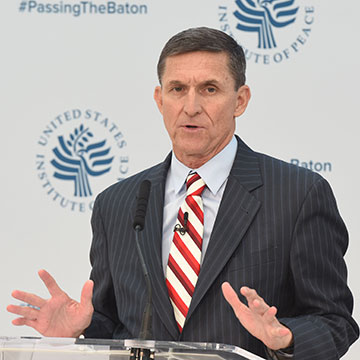 Lt. General Michael Flynn, the designated national security advisor, said his view that U.S. leadership and involvement across the globe will be crucial for the incoming Trump administration has been reinforced by transition discussions on foreign policy and national security held at USIP on Jan. 9-10.
Lt. General Michael Flynn, the designated national security advisor, said his view that U.S. leadership and involvement across the globe will be crucial for the incoming Trump administration has been reinforced by transition discussions on foreign policy and national security held at USIP on Jan. 9-10.
“The two big items that I take away from the last 24 hours … are the global leadership that the United States must demonstrate, and global engagement around the world that, whether we like it or not, the world demands,” Flynn told USIP in an interview on the sidelines of the “Passing the Baton” conference. “The United States, unlike any other country that’s ever existed, is the one country that is capable of doing that in a humble, but in a very strategic, smart and a very innovative way.”
Flynn, who appeared earlier in the day on stage with his outgoing counterpart, Susan Rice, and returned to the conference later, made his comments against critics’ concerns that the Trump administration might seek to reduce American engagement overseas. Traditional U.S. allies and partners have questioned Trump’s commitment to alliances such as the North American Treaty Organization (NATO).
“I think under President-elect Trump, we will see the United States of America essentially stepping into both of those arenas—both global leadership and globally engaging our partners around the world,” Flynn said in the interview.
Unpredictable Threats Are Inevitable: How to Prepare
How do security advisors, financial experts and political leaders prepare for threats they can’t see coming? In a panel on addressing destabilizing, unpredictable dangers, Kristalina Georgieva, CEO of the World Bank, the Heritage Foundation’s James Carafano, retired General Jack Keane of the Institute for the Study of War, and former Homeland Security official and current CNN national security analyst Juliette Kayyem attempted to forecast at least where the next administration’s surpise challenges may come from and possible protocols for meeting the unexpected.
“One of the certainties of the next administration is that they will have strategic surprise,” Keane said. Despite best efforts to predict what it will be, history suggests “we will fail miserably” in being prepared, he said. “No one has ever been able to predict the strategic surprise accurately of an incoming administration,” Keane said.
“Things we need to watch very carefully, are the very critical elections coming up in Europe,” Kristaline Georgieva, CEO World Bank, said. “What is going to be happening around the dates of these elections can have an unpredictable impact on the results.”
“We live in a world where trouble travels,” Georgieva said. “Shocks, especially those that are caused by the evil of man, a technologically connected world, and those caused by nature, put us all on equal footing.”
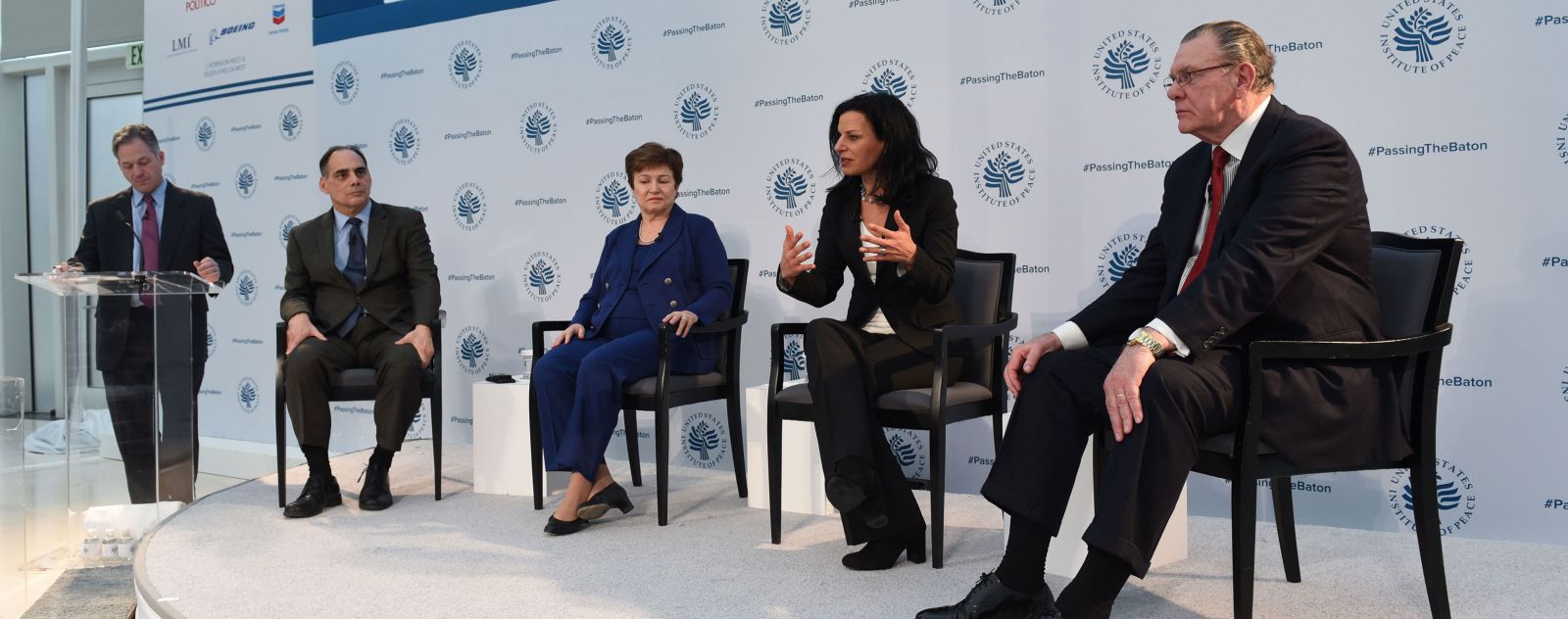
James Carafano, Kristalina Georgieva, Juliette Kayyem, General Jack Keane (ret.), Charles Lane
The evils of man might be more difficult to detect and anticipate when it comes in the form of a single person. Juliette Kayyem national security analyst for CNN and former senior Homeland Security official, said, “One of the issues that’s going to come up is this lone wolf, whack-amole terrorist, individuals who are not directed by ISIS but may be inspired by ISIS, who are looking to ISIS to give them justification. I worry about the ISIS-directed less than I worry about the other two.”
Keane urged the leaders of the next administration to prepare a national security policy that is actively used throughout the government to drive planning and to look ahead to possible challenges more like military planners do in preparing to meet differing enemies on various fronts. Most government entities fail to implement such plans because of day-to-day distractions and the difficulty of getting the principals’ attention. Even though a specific plan probably won’t address the crisis, the planning exercise and its contingencies will form basis for response, he said.
Despite the unknowable risks, Carafano said that the incoming administration has a tool that previous transition teams lacked: The presidential transition law, which was created in 2010 and expanded by executive order in May 2016. Carafano said the law has made the sharing of information substantially easier. “When you talk about passing the baton, there are people who are literally passing the baton, and not talking about politics, which has been very gratifying for me as an American citizen.”
Building Peace From the Ground Up: Experience in Iraq
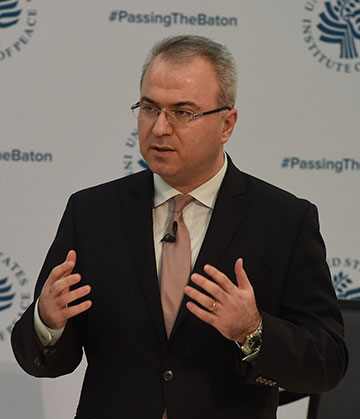 Building peace from the ground up through mediation between hostile communities is an ambition that can be realized through hard work and effective strategies, said Sarhang Hamasaeed, USIP’s director of Middle East programs. His experience supporting negotiations between Shiites and Sunnis in a violence-torn region of Iraq provides plenty of evidence, he said.
Building peace from the ground up through mediation between hostile communities is an ambition that can be realized through hard work and effective strategies, said Sarhang Hamasaeed, USIP’s director of Middle East programs. His experience supporting negotiations between Shiites and Sunnis in a violence-torn region of Iraq provides plenty of evidence, he said.
Growing up in an environment of persistent conflict made him an advocate for those living in, or displaced from war zones, he added.
Introducing himself as a witness and survivor of armed conflict, Hamasaeed said that he was four years old in 1980 when the Iraq-Iran war started, a conflict that would ultimately claim hundreds of thousands of lives.
He was 12 when the Iraqi dictator Saddam Hussein used chemical weapons on the city of Halabja, and embarked on the Anfal genocide operations in which some 4500 villages were razed, including the villages of his Iraqi Kurdish parents’ families. More than 180,000 civilians were taken away, only to be later found in mass graves.
“Anfal and Halabja made me ask, Where is the international community, where is humanity, where is God from all these killings?” Hamasaeed said.
“Like me, many of the people of the Middle East, especially the youth, are born into conflict,” he said. “Todays’ conflicts are arguably more complicated, regionalized, and globalized,” Hamasaeed said. “Violent conflicts that are in more streets and homes, not on far away front lines.”
“They are often forced to choose between carrots and sticks of religious parties, nationalist or other non-religious parties, armed and unarmed groups, or terrorist organizations,” Hamasaeed said. “These actors corner people and say, ‘Join us and you will have a better future: power, money, jobs, leadership, ideology; otherwise you will have no future.’ The threats, and the artificial choices that the youth of Iraq, Syria, Yemen, and elsewhere face today are at their worst when offered by a terrorist organization like ISIS/Daesh.”
Citing as an example of conflict resolution, Hamasaeed pointed to the peacebuilding work done in the wake of the massacre at Camp Speicher in June 2014, in which the Islamic State killed 1700 unarmed Shia military personel. Hamasaeed pointed to the ways that such acts can become recruiting tools at the local level. Instead, USIP worked with local organizations to create a dialogue where the violence was disavowed, justice was sought through formal channels, and tribal tensions were reduced.
“We need to work collectively, bottom-up and top-down to address the violent conflicts we have at hand and prevent future ones,” Hamasaeed said. “By using both approaches, and applying strategic patience, there ARE practical ways to make peace possible even in the toughest conflicts like Iraq, Syria, Afghanistan, and others.”
Rice Tells Flynn: ‘I Am Rooting Hard for You’

National Security Advisor Susan Rice and her designated successor, Lt. Gen. Michael Flynn, agreed, in an exchange of remarks, that their preparations for the handoff of presidential authority in 10 days’ time have been intensive and constructive. Rice started a 20-minute speech by speaking about the nonstop demands of the national security advisor’s job, saying to Flynn, “Mike, I imagine you’ll soon appreciate that, instead of a baton, I’d better be passing you a case of Red Bull.”
Rice praised what she described as an exemplary handoff of national security functions by the George W. Bush administration to the incoming White House staff of President Barack Obama.
“General Flynn inherits a vital job at a challenging time,” Rice said. “And while it is no secret that this administration has profound disagreements with the next one, I intend to make myself available to him, just as my predecessors have for me,” she told the audience. “We are all patriots, first and foremost. Threats to our security and democracy should be above partisanship.” She recalled a note from President George H.W. Bush as he handed office to President Bill Clinton that read, “Your success is now our country’s success. I am rooting hard for you.” Rice turned toward her successor. “General Flynn, I am rooting hard for you.”
Flynn started his remarks by asking the room to join him in a round of applause for her speech—and he thanked Rice and her team for what he said was a heavy investment in meetings and valuable memos “to help us be as well prepared as we can be before inauguration day.” He said Rice and other former national security advisors and staff “represent the collective wisdom and experience of some of America’s greatest national security thinkers, practitioners and doers.” He singled out former Secretary of State Madeleine Albright as well as Rice for bringing “a grace, a dignity, an elegance and a commitment to this country” in their help with the transition.
Kerry: ‘Not an Enormous Amount’ of Transition Work at the State Department
The joint description of an intensive transition at the National Security Council contrasted starkly with Secretary of State John Kerry’s account of the same process at the State Department. Asked by PBS journalist Judy Woodruff, “How is the transition process going?” Kerry was silent for a moment. “Well, it’s going pretty smoothly because there’s not an enormous amount of it. There are some people who’ve been in the building for a period of time, but quite candidly I think there has not been a lot of high-level exchange at this point in time. I’m still expecting to meet with my successor [Secretary of State Designate Rex Tillerson] at some point in the near term.”
Trump Tweets: Sometimes Useful, Often Concerning, Panelists Say
In a session devoted to national security priorities for the next administration, the conversation turned to the president-elect’s penchant for delivering short, controversial policy indicators via Twitter.
“It’s something we’ve never seen before, a number of tweets like this,” said moderator Martha Raddatz, ABC News’ chief global affairs correspondent. “Those tweets have moved markets, they’ve moved Ford, they’ve moved Carrier. How will it work in foreign policy? Can it move foreign leaders?”
Former Secretary of State Madeleine Albright, couching her response as an effort “to be polite,” said that she was troubled by the social media outbursts. “I am very concerned about the tweets and the messages that are going out,” she said. “The United States needs to be engaged, and that is the message we need to get out there. Not as ‘American first’ but America as a partner.”
While some in a digital age might view established systems for making policy and conducting diplomacy as old fashioned, they exist for a purpose, Albright said,
“There has been a system in place in the world for a very long time, of how governments communicate with each other, how presidents communicate with each other, how documents are developed, how they are part of some sort of decision making process that reflects what the government thinks, and what Congress thinks and what the American people think,” Albright said, “and the tweets don’t deal with that.”
Asked if Trump isn’t just being deliberately disruptive as part of his pledge to change Washington, Albright replied, “It is essential that there be some understanding of what the track is, what the role of the U.S. is, how we behave as a responsible power. And tweets don’t do it for me.”
Retired Admiral James Stavridis, the dean of Fletcher School at Tufts University and a former Supreme Allied Commander for NATO, said that social media posts have their place that as part of a comprehensive communications strategy, but it’s important to recognize the trickle-down effect off-the-cuff remarks could have on people down the chain of command, including military officers in the field.
“There is an unpredictability that the president elect has embraced and on many issues that can be useful politically but on the global stage, the U.S. has to be predictable,” Kempe said. “Its allies have to know where it stands. Its adversaries have to know where it stands. Accompanied by tweets, that’s OK and it can be effective. But it has to be backed up by strategy.”
Albright Appeals for Clarity on U.S. Role in the World
Among the myriad foreign policy and national security issues facing the incoming Trump administration, its first priority should clarifying how it sees the U.S. role in the world, especially in relation to China, Russia and Europe, former Secretary of State Madeleine Albright told USIP in an interview.
“I think that’s something that should occupy [the new administration] because it’s front-and-center,” she said. The incoming and outgoing administrations haven’t sufficiently discussed those issues during this transition period, despite an “openness to understand” how the issue will affect the new administration’s stance in the world, Albright said at “Passing the Baton.”
Read about discussions held last night in the first part of the conference.
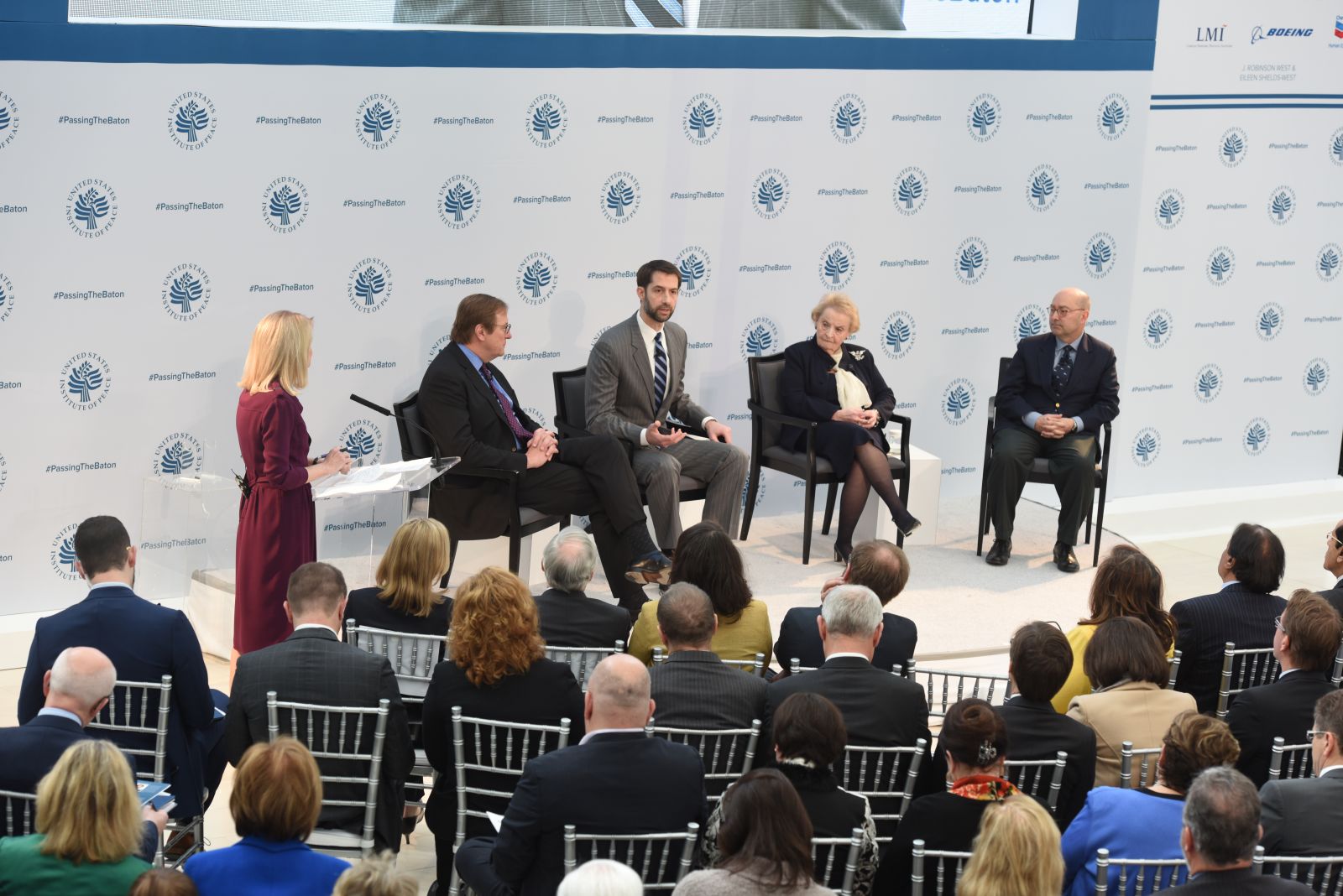
Frederick Kempe, Senator Tom Cotton, Madeleine Albright, Admiral James Stavridis
Cyber, Terrorism and a Clear Policy Called Top Priorities of New Administration
In a discussion touching on cyber security, the rising threat of non-state actors and the impact of President-elect Donald Trump’s tweets, former Secretary of State Madeleine Albright, Senator Tom Cotton, Atlantic Council President Frederick Kempe and retired Admiral James Stavridis outlined their top priorities for the incoming administration.
Stavridis, the dean of Fletcher School at Tufts University and a former Supreme Allied Commander for NATO, said that cyber security is among the key challenges the new administration faces. “In cyber we have the greatest mismatch between the level of threat—which is quite high—and our level of preparation, which is quite low,” he said.
Cotton, an Arkansas Republican who serves on the intelligence and defense committees, said his views are largely consistent with goals Trump has already expressed. “We need substantial increases in our defense budget,” he said. “A thorough review of our nuclear posture, and to accelerate the shale revolution in American energy production.”
Deeper U.S. engagement and more active leadership in international conflicts is essential, Kempe said. “There is no one else to substitute for us, and if we don’t do it other less benevolent actors or chaos will fill the void,” he said. Kempe said if there any tweet he wanted to see from Trump, it would say: “Make global America great again.”
Albright and Stavridis said Trump’s declared affinity for unpredictability has a place in the conduct of U.S. foreign policy as what Stavridis called “a shot of espresso.” But both cautioned that predictability and more traditional means of communication than Twitter should be the norm to define policies that allies, adversaries and subordinates clearly understand. “Disruption is interesting theory,” Albright said, “but destroying doesn’t help.”
Albright also called for a more modern, responsive government, which will be able to meet its constituents on multiple platforms. Drawing on language from the tech world, Albright said “People are talking to their governments on 21 century technologies. Governments are listening on 20th century technology and responding with 19th century technology and solutions.”
Kerry Defends Obama Administration Foreign Policy Record
 Secretary of State John Kerry defended the Obama administration’s foreign policy record against what he called “revisionist commentary” that questions the global leadership of the outgoing administration. Kerry cited policies ranging from the Paris climate change agreement to the Iran nuclear deal and efforts to stop the spread of the Ebola epidemic as examples of successes for which the administration has received too little credit.
Secretary of State John Kerry defended the Obama administration’s foreign policy record against what he called “revisionist commentary” that questions the global leadership of the outgoing administration. Kerry cited policies ranging from the Paris climate change agreement to the Iran nuclear deal and efforts to stop the spread of the Ebola epidemic as examples of successes for which the administration has received too little credit.
“What troubles me a little bit is that people are not separating a remarkable transformation that has taken place globally, naturally, from things that we’re really responsible for,” Kerry said in a discussion moderated by PBS NewsHour anchor Judy Woodruff. “Arab Spring -- we didn’t start the Arab Spring. We couldn’t have stopped the Arab Spring. We couldn’t have put a lid on it.”
“But as I listen to some of the revisionist commentary, and they’re saying ‘Well, the Obama administration didn’t do this or didn’t do that or whatever,’ there’s no way the Obama administration doing anything would have changed what was happening in those countries. It happened, spontaneously, because of where those countries found themselves relative to modernity, to the global economies, to their own governance challenges and to the centuries old passions and definitions and differences that have defined those countries for a long time.”
Hadley Calls for Bipartisanship in U.S. Foreign Policy
USIP Chairman Stephen J. Hadley, a former national security advisor, opened the “Passing of the Baton” proceedings today with a call for bipartisan continuity in American foreign policy as the Obama administration prepares to hand control to incoming Trump administration officials.
“Each administration assumes office with both the problems and the tools left by its predecessor,” said Hadley, who served as national security adviser to President George W. Bush. “A well-managed presidential transition can help the new administration get a jump on the problems and get a better appreciation of how to handle the tools [for] addressing those problems.”
“The goal of a presidential transition should be for an outgoing presidential administration to do as much as it can to help the incoming administration assume the awesome responsibilities that it is about to inherit,” Hadley said.




